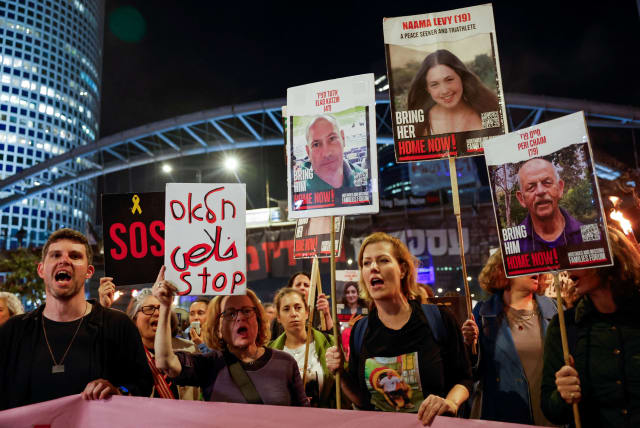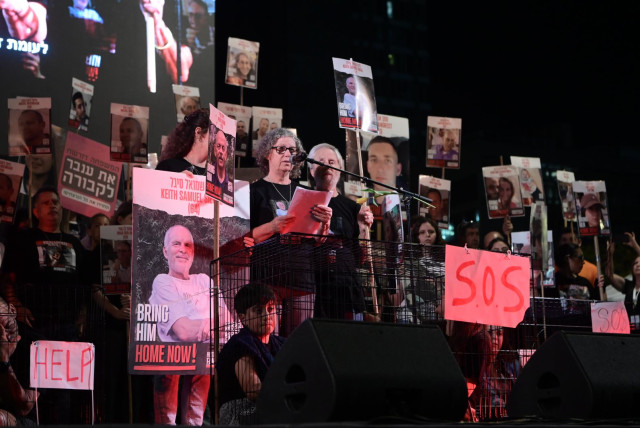Where is the world's outrage on behalf of the hostages in Gaza?

Our outrage becomes more pronounced when we compare the response and public sentiment around Israel’s hostages to previous hostage crises that live in our collective memory.
The six-month milestone of the Hamas pogrom is fast approaching. On April 7, we will mark half a year since Hamas massacred 1,200 Israelis and abducted another 250 to the Gaza Strip. Over 130 of those captives remain in the terror army’s dungeons.
The plight of the hostages has outraged the Israeli public and the global Jewish Diaspora, who are plastering streets with hostage posters and organizing empty Shabbat tables and vigils to symbolize the absence of loved ones. Every single Sunday, you will find dozens of Jews and Israelis rallying in New York’s Central Park, on DC’s National Mall, and in cities around the globe to continue raising awareness.
But where is the rest of the world?
Our outrage becomes more pronounced when we compare the response and public sentiment around Israel’s hostages to previous hostage crises that live in our collective memory.
When Boko Haram, the radical militant West African group, abducted hundreds of Nigerian schoolgirls, the world spoke up. Countries around the world jumped into action to rescue them. Israel reportedly sent a team of intelligence experts to assist in the search and a joint US-Israel modified aircraft was used for reconnaissance. #BringBackOurGirls was for a time Twitter’s most tweeted hashtag around the world.
When the Kremlin wrongfully imprisoned American basketball player Brittney Griner, her case became a cause célèbre on social media.
Those of us old enough to remember recall the wave of emotion that swept the United States during the Iranian hostage crisis. The whole country – and the Western world – held in their hearts our diplomats whom the mullahs had cast into their prisons. Around the six-month mark of their detention, the wife of one of the hostages decided to tie a yellow ribbon around a tree in her yard as a symbol of faith that her husband would one day return. Her gesture caught like wildfire and yellow ribbons appeared on homes around the country.
Israelis and American Jews, still relating to this symbol as one of hope, have donned similar blue and yellow ribbons since day one. But the silence for the Israeli hostages in Gaza is deafening. You would be hard pressed to find someone outside the Jewish community, besides our supportive elected officials, donning a ribbon for the hostages held by Hamas, even for the Americans among them.
Rarely do the faces of the hostage make front page news
As the mainstream media is flooded with images of Gaza, rarely do the faces and stories of the hostages make the front page. Some on the far-Left do worse than say nothing: They ridicule our hostages and deny the tribulations to which they have been subjected. The media – and the public – need to take a long, hard look at themselves and ask where their priorities and morals are.
Just this week, we learned more about the depredations the hostages are enduring. Amit Soussana, released as part of the last ceasefire, publicly recounted the rape she endured at the hands of one of her captors, who compelled her at gunpoint. One can only imagine what the women still held in Gaza are experiencing, keeping front of mind that some may unimaginably be reaching the sixth month of pregnancy as the result of rape. Further, many of the hostages are elderly and ailing, desperately in need of life-saving medication and treatment. What medical care the hostages have received has reportedly included being operated on by veterinarians without anesthesia.
We also learned this week of the death of another hostage – 35-year-old Uriel Baruch. This brings the number of confirmed hostage deaths to 34 individuals, with another 96 hostages whose fates are unknown. This unbelievable reality reminds us that the hostages are quite literally running out of time.
In this cruel war – one that Israel did not seek but will win – the plight of the hostages pains each and every Jew throughout the world. If only the rest of mankind, or at least the Western world, viewed their ordeal with the same gravity.
Bring them home now.
The writer is the CEO of the Conference of Presidents of Major American Jewish Organizations (COP), the recognized central coordinating body representing 50 diverse national Jewish organizations on issues of national and international concern. Follow him on X at @daroff.
Jerusalem Post Store
`; document.getElementById("linkPremium").innerHTML = cont; var divWithLink = document.getElementById("premium-link"); if (divWithLink !== null && divWithLink !== 'undefined') { divWithLink.style.border = "solid 1px #cb0f3e"; divWithLink.style.textAlign = "center"; divWithLink.style.marginBottom = "15px"; divWithLink.style.marginTop = "15px"; divWithLink.style.width = "100%"; divWithLink.style.backgroundColor = "#122952"; divWithLink.style.color = "#ffffff"; divWithLink.style.lineHeight = "1.5"; } } (function (v, i) { });

